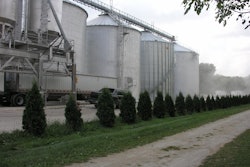It’s a challenge with which every operation struggles: when to expand facilities to accommodate your growing business, and how to accomplish that expansion in a way that satisfies your company’s unique needs, goals and issues. Businesses within and supporting our nation’s agricultural industry, regardless of their sectors, face unique expansion considerations, such as varying space requirements with the passing of seasons, the need for neighboring property and the goal of preventing competitors from gaining access into your market. Taking time to really consider why your company needs extra space, for what purpose it will be used, and when and how often it will be used — all before the need itself is at a critical level — can help a company avoid costly mistakes, more closely fit its expansion plans to its actual needs and be better able to recognize a good opportunity when it arises.
Sometimes strategy and opportunity combine to make expansion of your current facility or operations particularly attractive, even if expansion wasn’t already on your company’s agenda. A neighboring property coming up for sale or lease is an opportunity that should be carefully considered, even if the growth which would necessitate that extra space isn’t anticipated for a few years. Likewise, space being made available by an existing competitor exiting the area, or the availability of space that allows a new competitor easy entry into your market each require thoughtful consideration. If a company has taken the time before these opportunities present themselves to plan its expansion strategy, the question of whether these “out of the blue” opportunities really make sense is more easily answered.
The following topics explore considerations that should factor into any discussion regarding expansion and can help guide a company through the process of determining the right time and right way to expand.
What are your needs and opportunities?
Seasonal expansion can be an excellent solution for companies whose needs for extra space come and go, whether it be for storing extra vehicles or equipment used only during the busy season, staging areas for vehicles waiting to load or unload, or temporary or seasonal storage of excess goods or raw materials. In these cases, important consideration should be paid to whether there are issues that would justify controlling the area year-round, or if occupying – and paying for — the area only when needed is a viable solution. If your business’s strategic plan includes expansion in the coming years, then keeping an eye out for properties, either near your current facility or in a new location, is critical. However, it’s important to know what you need, how much you need, and why you need it, before an opportunity presents itself. Conversely, sometimes an opportunity to expand into a new market, to keep a potential competitor from making a move into your area, or to lease or acquire a neighboring property that could be useful in the future, are situations in which opportunities necessarily have to get ahead of strategy.
What will you use it for?
Are you looking to expand because you need larger indoor storage facilities? A staging area for vehicles? A larger office for administrative functions? Something else entirely? A company’s day-to-day use of space is typically the first topic that arises when considering expansion. Use this opportunity to critically examine how the company operates out of its current location, how it achieves its business goals, and ways that those activities can be optimized, improved and enhanced by having a larger or better physical space. In some cases, a company can satisfy its needs for more space by leasing nearby space on a temporary or recurring seasonal basis and only incurring rental costs during the months that they really need the extra room. If a company really only requires seasonal access to the added space, is there a strategic partnership that can be explored to co-locate operations with another company that needs it at different times of the year? Conversely, does it make sense to acquire a more remote and lower cost site, which the company can use seasonally but control year-round, to ensure regular access and avoid risks associated with third parties operating from the same location at other times? Sometimes, when a company’s operations include potentially hazardous activities or carry the risk of environmental contamination, the benefits of having sole control of the property far outweigh the savings achieved when that savings is accompanied by increased risk. Additionally, many companies find that they will use the new space much more than originally anticipated simply because it’s available.
Where do you go?
When looking to expand your current facility within the same geographic area – distinguished from opening an additional location or facility nearby – most companies find that expanding into land that shares a property line with your current location (known in real estate parlance as contiguous property) is the easiest way to go. While contiguous expansion has significant advantages, many agricultural operations find that it’s not critical, especially when non-contiguous space offers a significant cost advantage. Being willing to consider non-contiguous properties, even those a few blocks or a couple of miles away from your current location, can provide price advantages and a larger selection of attractive sites. It also reduces leverage for a neighboring property owner who thinks he or she can sell or lease a contiguous site at a significant profit because of the convenience which it offers. Additionally, in today’s world, with the ease of communication between remote locations, many operators find that there is no operational disadvantage – and often unexpected advantages – to having a facility spread over multiple locations, especially when the price of entry can free up capital needed to otherwise grow and develop the business.
How will you acquire the space?
Another consideration of expansion is how you’ll take control of the property you’re seeking to utilize. Purchasing and leasing, or even entering into a short-term license agreement, each have their pros and cons. Generally speaking, purchasing property on which you intend to build a facility provides the greatest measure of control, but also requires the greatest up-front investment. Beyond the purchase price and construction costs, take into account the fees of the various professionals who will help you evaluate the property; examine title; conduct geotechnical, soils and environmental studies; and obtain the approvals and permits necessary to construct and operate. Some companies enter into ground leases or build-to-suit arrangements as a way to structure the financial investment needed to expand. Others find already constructed facilities that require little customization and are prime targets for short- or long-term lease arrangements. Remember that whenever a company looks to lease a facility, the greater the investment the company looks to make, the longer the lease term (or additional options to extend an initial lease term) should be, to protect the company’s investment.
The path between realizing a company wants or needs more space, and moving into or onto that new space is full of twists and turns. There are many decisions to be made, and considerations to be taken into account, with nuances unique to every company and business model. The key to all of this is being mindful, organized and considerate in your approach. Don’t assume that because you have a facility in one place, the new area must be immediately adjacent. Likewise, just because you’ve always leased your facilities, don’t discount the prospect of making a strategic purchase. Good opportunities are available, and if well executed, a need for more space can serve as a multiplier: giving a business an opportunity to use the needed expansion as a way to not just meet a need but also to optimize processes and look at business strategy through fresh eyes.
Whom do you call to learn more?
Any time a business is exploring the prospect of expansion, your county or town planning department and local realtors can serve as excellent sources of information and assistance. As choices are narrowed and decisions regarding the type of expansion are reached, a business-oriented transactional attorney who can help negotiate the deal, structure the transaction, prepare the documents, and oversee the inspections and due diligence, can be a great partner in the process. Finally, engaging the company’s financial professionals and CPAs is critical to ensure that the new acquisition is integrated with the company’s overall tax and financial strategy. With a bit of advance planning and the help of a team of professionals to guide you, the decision to expand your business’s footprint can do more than just meet a need; it can be the first step to a more profitable future.


















